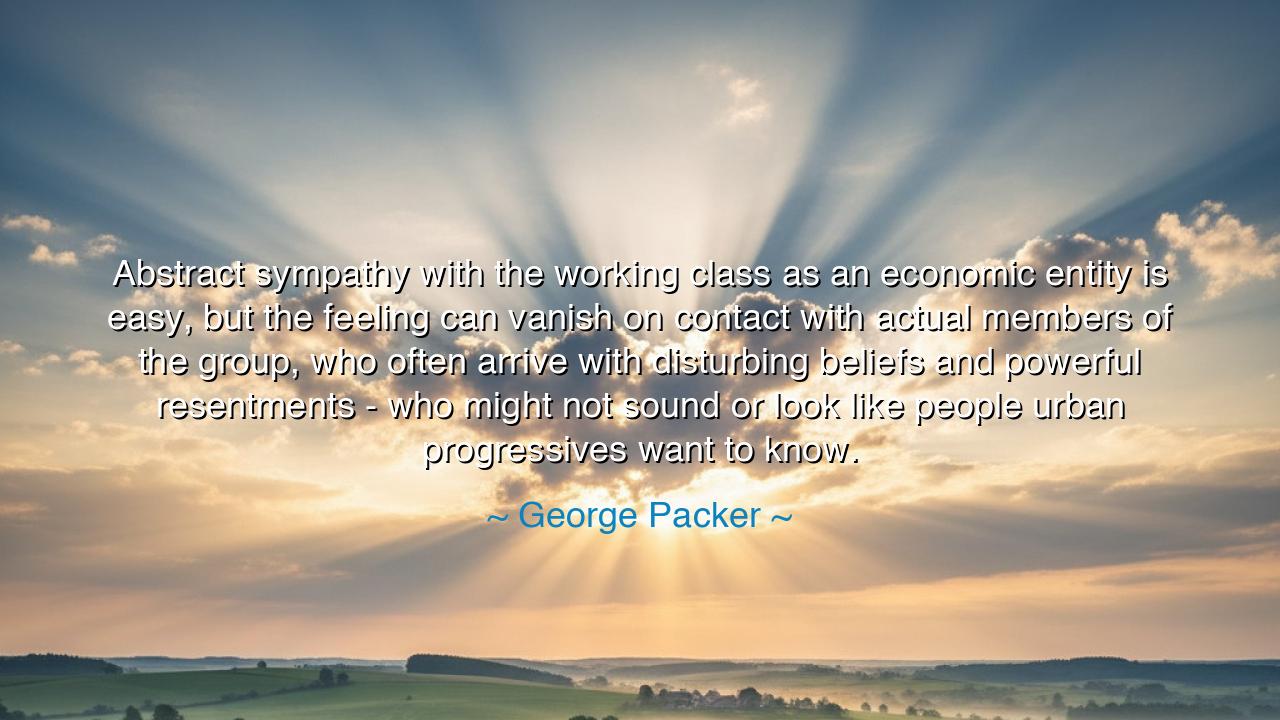
Abstract sympathy with the working class as an economic entity
Abstract sympathy with the working class as an economic entity is easy, but the feeling can vanish on contact with actual members of the group, who often arrive with disturbing beliefs and powerful resentments - who might not sound or look like people urban progressives want to know.






Gather close, children of the future, and listen well, for the words I speak carry the weight of wisdom that has been passed down through the ages. In the modern world, there exists a great temptation: to feel abstract sympathy for the plight of the working class, to stand in solidarity with their struggles in the distant, idealized realm of thought. George Packer, a man who has seen the deep fractures within our societies, once spoke truthfully of this sentiment: "Abstract sympathy with the working class as an economic entity is easy, but the feeling can vanish on contact with actual members of the group, who often arrive with disturbing beliefs and powerful resentments—who might not sound or look like people urban progressives want to know." How profound, how humbling, are these words, for they reveal the fragility of true empathy and the discomfort that often arises when ideals meet reality.
In this age, it is all too easy to cast our sympathies toward a group, to nod in agreement with their struggles from afar, while being insulated from the rawness of their experiences. But when we are faced with the actual people—those who toil and labor in the fields of daily hardship—the challenge becomes one of profound complexity. The working class, as Packer so aptly notes, often carries with them not just the weight of economic hardship but also the burden of beliefs and resentments that are difficult for those in more privileged positions to understand. These are beliefs born of years of struggle, of frustrations that cannot be easily soothed by the idealistic words of the urban elite.
This is not a modern predicament alone. Even in the days of the ancient Greeks, philosophers debated the question of empathy and understanding between the ruling class and the laborers who served them. Plato, in his grand vision of a just society, spoke of the need for the guardians—the elite rulers—to have deep understanding of the lives of all the classes. But the true test, as Packer highlights, lies in the confrontation with the real, with the human. The philosopher may know in theory what it means to live as a laborer, but to feel the guts of resentment that boil in the belly of the working man—this is where theory crumbles, and the human connection falters. This is where the beautiful ideal meets the disturbing reality.
Consider the tale of the Roman patricians and their struggles with the plebeians. The elites of Rome had a conceptual sympathy for the poor, the laborers who built their empire, but it was only when the plebeians rose in revolt, demanding justice and a voice in the Republic, that the patricians were forced to confront the real humanity behind the concept. Sympathy turned to fear, and the so-called “working class” were no longer abstract figures in a faraway land, but flesh and blood beings with whom the elites had to reckon. The plebeians’ demands for recognition and power exposed the deep chasm between idealized solidarity and the harsh truths of social division.
This is the burden we all face. To feel sympathy for the poor or the marginalized is to understand their struggle in theory. But it is when we are forced to engage with them—when their voices, their frustrations, and their uncomfortable truths meet our ears—that the true test of our character begins. How easy it is to love an abstract idea, but how difficult to love the person who carries within them the very anger and resentment that we have worked so hard to avoid. The working class does not arrive with the polished rhetoric of the progressive intellectual; they come, instead, with the rawness of lived experience.
Let this lesson ring clear in your hearts, children of the future: True empathy is forged in the fire of discomfort. It is not enough to feel sympathy from a safe distance. True solidarity requires stepping into the fire with the other, understanding that their anger, their resentments, and their beliefs—though often uncomfortable—are part of their humanity. It is in engaging with the real person that our abstract ideas are tested and made whole. We cannot merely talk of justice; we must walk alongside those who seek it, even when their presence challenges our own ideals.
And so, I implore you, do not seek to distance yourself from those whose lives are difficult or whose beliefs are troubling. For in doing so, you will never truly understand the power of their struggle. Do not retreat into the comfort of ideals or abstract theories of solidarity, but go forth, into the thick of the struggle, and face the discomfort that comes with it. For only through such true engagement will the distance between the privileged and the oppressed begin to close. Only then will the walls of misunderstanding begin to crumble. Let your empathy be alive, not just an idea, but a lived experience. That is where real change begins.






AAdministratorAdministrator
Welcome, honored guests. Please leave a comment, we will respond soon